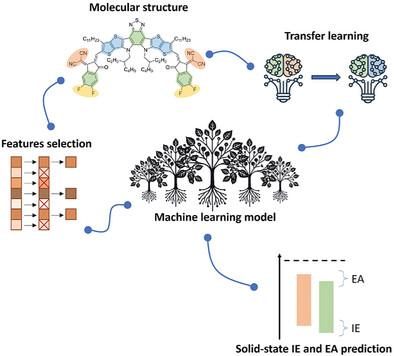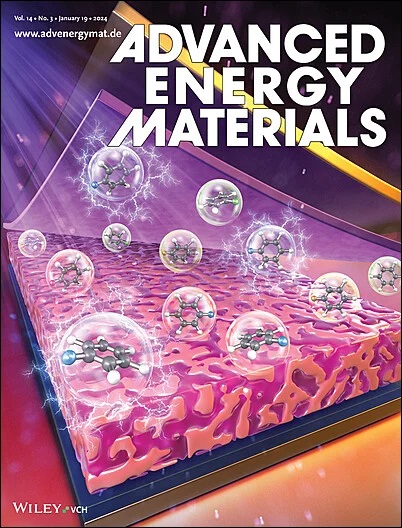从实验值到预测模型:有机半导体中机器学习驱动的能级测定
IF 24.4
1区 材料科学
Q1 CHEMISTRY, PHYSICAL
引用次数: 0
摘要
电离能(IE)和电子亲和能(EA)的精确测定对于有机半导体(OSCs)的开发和优化至关重要。这些参数直接影响有机电子器件的性能。测量IE和EA的实验技术,如UV光电子能谱(UPS)和低能逆光电子能谱(LE-IPES),是准确的,但资源密集且受其可用性的限制。计算方法虽然有益,但往往依赖于气相计算,无法捕捉固态现象,导致实际应用中的差异。在这项工作中,机器学习方法被用来开发一个链式模型来估计固态IE和EA值。通过实施迁移学习策略,有效地解决了实验数据有限的挑战,利用大型中间属性数据库来增强模型训练。通过IE和EA的平均绝对误差分别为0.13和0.14 eV,证明了该模型的有效性。该模型还在包含新测量分子的外部验证数据集上进行了测试。这些发现突出了机器学习在OSC研究中的潜力,显著提高了属性可及性,加速了分子的设计和发现。本文章由计算机程序翻译,如有差异,请以英文原文为准。

From Experimental Values to Predictive Models: Machine Learning-Driven Energy Level Determination in Organic Semiconductors
The precise determination of ionization energy (IE) and electron affinity (EA) is crucial for the development and optimization of organic semiconductors (OSCs). These parameters directly impact the performance of organic electronic devices. Experimental techniques to measure IE and EA, such as UV photoelectron spectroscopy (UPS) and low-energy inverse photoelectron spectroscopy (LE-IPES), are accurate but resource-intensive and limited by their availability. Computational approaches, while beneficial, often rely on gas-phase calculations that fail to capture solid-state phenomena, leading to discrepancies in practical applications. In this work, machine learning methods are used to develop a chained model for estimating solid-state IE and EA values. By implementing a transfer learning strategy, the challenge of limited experimental data is effectively addressed, utilizing a large database of intermediate properties to enhance model training. The efficacy of this model is demonstrated through its performance achieving mean absolute errors of 0.13 and 0.14 eV for IE and EA, respectively. The model has also been tested on an external validation dataset comprising newly measured molecules. These findings highlight the potential of machine learning in OSC research, significantly enhancing property accessibility and accelerating molecular design and discovery.
求助全文
通过发布文献求助,成功后即可免费获取论文全文。
去求助
来源期刊

Advanced Energy Materials
CHEMISTRY, PHYSICAL-ENERGY & FUELS
CiteScore
41.90
自引率
4.00%
发文量
889
审稿时长
1.4 months
期刊介绍:
Established in 2011, Advanced Energy Materials is an international, interdisciplinary, English-language journal that focuses on materials used in energy harvesting, conversion, and storage. It is regarded as a top-quality journal alongside Advanced Materials, Advanced Functional Materials, and Small.
With a 2022 Impact Factor of 27.8, Advanced Energy Materials is considered a prime source for the best energy-related research. The journal covers a wide range of topics in energy-related research, including organic and inorganic photovoltaics, batteries and supercapacitors, fuel cells, hydrogen generation and storage, thermoelectrics, water splitting and photocatalysis, solar fuels and thermosolar power, magnetocalorics, and piezoelectronics.
The readership of Advanced Energy Materials includes materials scientists, chemists, physicists, and engineers in both academia and industry. The journal is indexed in various databases and collections, such as Advanced Technologies & Aerospace Database, FIZ Karlsruhe, INSPEC (IET), Science Citation Index Expanded, Technology Collection, and Web of Science, among others.
 求助内容:
求助内容: 应助结果提醒方式:
应助结果提醒方式:


